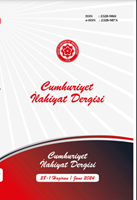“Dünya Müminin Zindanı, Kâfirin Cennetidir” Rivayetinin Analizi ve Metaforik Bir Yorum Denemesi
An Analysis and Metaphorical Interpretation of the Tradition "The World is the Believer's Dungeon and the Unbeliever's Paradise"
Author(s): Furkan ÇakırSubject(s): History of Islam, Sociology of Religion, History of Religion
Published by: Cumhuriyet Üniversitesi İlahyat Fakültesi
Keywords: Hadith; World; Believer; Dungeon; Metaphor;
Summary/Abstract: This study deals with the hadith attributed to the Prophet, "The world is the believer's dungeon and the unbeliever's paradise". A literature review of the aforementioned hadith reveals no independent research on the subject. In fact, there are many studies in our scholarly tradition that examine a single hadith in all its aspects. However, the fact that the hadith in question is considered to be a conventional hadith with a clear message may be the reason why it has not been the subject of both Arabic and Western studies. The narration has been found to be transmitted from five different companions of the Prophet in various texts in the main hadith sources. In our research, the value of the narration in terms of the science of hadith is discussed by analyzing the texts and the sanads separately. Since the narration has many versions, the research is limited to marfū' narrations. The chapter titles under which the narration is found in the main hadith texts and how the text is approached in classical hadith commentaries have been analyzed. It has been determined that the narration has become an integral part of the subject of "zuhd" (renunciation) and accordingly has an important place in the literature of preaching and guidance. The statements in the hadith about the believer's relationship with the life of the world have led to its association with zuhd, which can be roughly defined as "turning away from everything mortal". The hadith commentators, on the other hand, associated the aforementioned narrations with the temptation of worldly desires, the difficulty of being obliged to continuous and arduous acts of worship, and the need to be patient with the calamities that befall individuals in the world. In this respect, it is seen that the commentators evaluated the hadith from a similar perspective. In our study, it has been determined whether it is possible to evaluate the hadith from a different perspective considering the metaphorical narrative form in the Qur'ān and hadith texts. Because metaphor is an important element of rhetorical arts and is the art of establishing a meaning connection between different subjects without using prepositions of analogy. Although it bears similarities with types such as allegory, metaphor, simile, allegory and allusion, it differs from the others in that it strengthens the words by emphasizing the style of expression rather than the subject matter. Metaphors not only add depth to the world of thought, but also allow complex or abstract concepts to be expressed more clearly. While revealing the power of language, it increases the emphasis of the message contained in the narrative by reinforcing the ability to establish creative thinking and emotional connections and makes a deeper impression on the interlocutor. Based on all these, when it is accepted that the concept of "dungeon" in the relevant text contains a metaphorical meaning, it can be said that it is open to a new interpretation attempt. We have chosen a way of interpretation against the crisis of thought and morality that has emerged especially in the modern period in a clear, obvious and noticeable level, and we have handled the related narration with a metaphorical interpretation attempt by considering the relationship between civilization and sunnah of the Prophet. It is argued that in these words the Messenger of Allah rejected the one-worldism of decadent and decaying civilizations as a source of injustice and misery, rejected over- or under-valuing blessings and deprivations, and sought to raise consciousness against those who think that they will lose everything at death. In addition, there are a number of crises that prevent modern man from reviving Islamic civilization. These are spiritual, individual, intellectual, metaphysical and social crises. Man can overcome the spiritual crisis by spiritual progress and enlightenment; the individual crisis by not leaving values to desires; the intellectual crisis by developing critical thinking in a way that is open to different ideas; the metaphysical crisis by turning away from worldly temptations and existential constraints and turning towards the search for knowledge and meaning; and the social crisis by contributing to changes in society and fighting for human rights. In our research, the idea that human beings can overcome these crises and gain freedom and establish their own civilization by getting out of the dungeon is put forward through a metaphorical interpretation. In this way, it has been examined whether it is possible to identify the problems we face in the modern period and to propose solutions to these problems by feeding on the narration culture. In this context, the discussions around how the narration "The world is the believer's dungeon and the unbeliever's paradise" is understood or should be understood have been touched upon and a new interpretation has been sought. This searchhas been labeled as an "experiment" and it is aimed that subsequent researchers will make much more comprehensive experiments.
Journal: Cumhuriyet İlahiyat Dergisi
- Issue Year: 28/2024
- Issue No: 1
- Page Range: 60-80
- Page Count: 21
- Language: Turkish

